This post was contributed by guest blogger Melanie Fox, founder and executive director of Central Indiana Science Outreach and a Postdoc at Indiana University School of Medicine.
It’s not always easy to figure out what you want to do after graduate school, at least not while you’re still in the thick of it. About three or four years into my PhD in Molecular Biology, I realized I wanted a career in science outreach: engaging the public to promote an awareness and understanding of science. Like most science PhD programs, mine was geared toward careers in academia or industry. Luckily, I discovered that there are many ways to get a taste of a variety of careers while still working towards your degree. For me, experimenting with the career and networking opportunities available to me as a graduate student culminated in my founding a nonprofit called Central Indiana Science Outreach, or CINSO. We organize fun science events for adults and professional development opportunities for researchers interested in connecting with the public. My experiences in grad school, though often called “nontraditional,” helped prepare me to start CINSO. Here, I share some of the tips I learned along the way and hope they’ll help you make the most of the opportunities you’re provided throughout your PhD program.
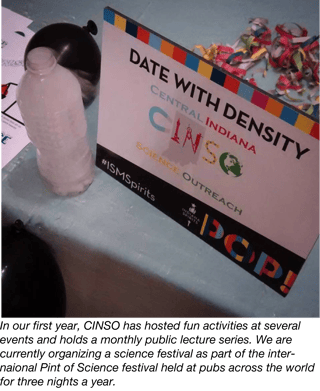 Find people who will support your professional development
Find people who will support your professional development
I had a wonderfully supportive mentor and graduate office. I cannot stress how important they were to my success as a student. They didn’t always know the best direction to guide me because they had no experience with my career path, but they had my back.
If your advisors are not as supportive of your career goals, find people who are. I wanted to do fun science activities with the public, so I reached out to people who were educating the public and organizing events. I contacted local professional organizations and nonprofits. I volunteered at events like Celebrate Science Indiana and sent emails to any group with a “Contact Us” button on their website. Then I had a lot of coffee with potential new friends. Without the encouragement and pep talks from these contacts, I would have quit my “nontraditional” career path long ago.
Use your analytical mind to test and discover what career suits you best
I began viewing my activities as types of experiments. I searched for new opportunities with an open mind and open ears. Everyone I talked to provided new data. Every new experience taught me something about myself and my future career. If it wasn’t something I liked – well, I was used to experiments not working, so just like in lab, I sucked it up and moved on to the next thing. If I made a mistake, I evaluated what lessons I had learned – call it “troubleshooting.” Trying out new experiments and new ideas is nothing new to a scientist. Framing my efforts in these comfortable terms helped guide me through the process.
As I mentioned, my graduate office staff was amazingly supportive. I talked to them about my interests and my ideas all the time. Once, I had this crazy idea that I needed help with: wouldn’t it be fun to get several of the labs in our program to write short, funny, picture-filled blog posts about their research? Then we could get everyone to share their articles on social media and have their friends vote for their favorite. This seemed like a great way to share some of the research taking place at our university with the community. I even spray painted a small erlenmeyer flask with gold glitter spray paint to make a trophy for the winner. We promoted the contest for about two months, and we got one submission.
I was a bit disappointed in the lack of participation, but I decided to focus on what the experience taught me. The article submitted was hilarious, full of interesting information, and received a lot of attention on social media. I gained a concrete example to use to promote future attempts and learned a bit about recruiting scientists to outreach. 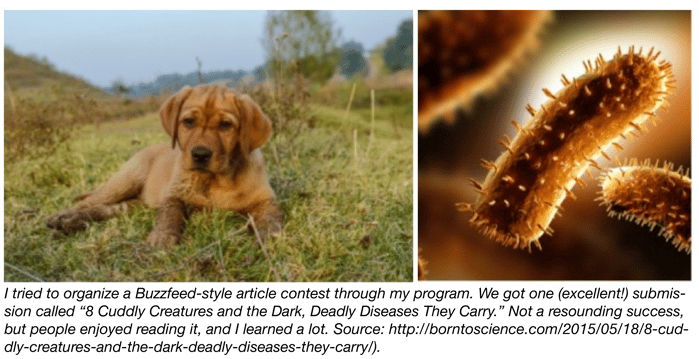
Try new things to further your career
Take advantage of opportunities provided by your programs and departments
Graduate school was an excellent time to try new things, develop new skills, and meet new people. There were visiting seminar speakers each week, my department and graduate office arranged opportunities to meet with various professionals, and there were multiple avenues for professional development including workshops and networking events. I took advantage of as many of these resources as I could. Networking and learning from the careers of others were key to creating my career path. Luckily, in grad school much of the up front work was done for me. I just had to take advantage of it.
Blog and tweet
I started my blog, Born to Science, as a graduate student, and I love it. I am able to write about any topic I like and gain experience in communication, editing, marketing, and website organization. My short experience with my blog helped immensely when CINSO started brainstorming the resources we wanted to provide online.
Twitter is an excellent resource that has gained a lot of traction with researchers. It is an excellent way to meet people with similar interests! Especially as someone interested in doing science outreach, not only can I easily share science with the public, but I can watch and learn from the experts in science communication in real time! I follow great online science communicators like Phil Plait @BadAstronomer, Emily Graslie from The Brain Scoop YouTube channel @Ehmee, and David Shiffman @WhySharksMatter and see what kind of content they share and produce and how they interact with their followers. It’s also been a great place to reach out to local establishments such as museums, professional organizations, and other nonprofits to gain support for CINSO. For instance, I tweeted to the Indiana State Museum and others when I was trying to find local informal science educators, and ever since, the State Museum has been the best supporter and most productive partnership CINSO has had.
Volunteer!
The turning point in my graduate experience, the point at which my career path began to take shape, was when I started volunteering. I wasn’t sure yet what a career in science outreach would look like for me, but everything I read from career guidance sources such as myidp.sciencecareers.org mentioned museums. Indianapolis is home to one of "The world’s biggest and best children’s museum", The Children's Museum of Indianapolis.
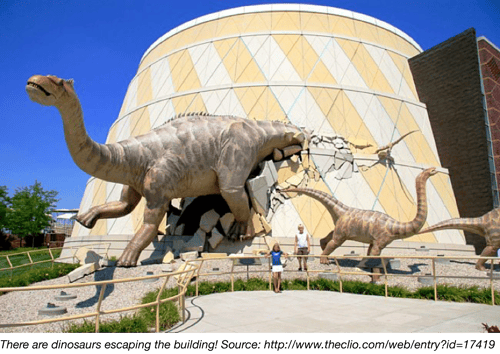 I drove passed these dinosaurs every day. They made me happy. Grad school can provide plenty of negativity, so I volunteered at a place that made me happy. I started volunteering in the “Dinosphere” almost every week. I gained experience explaining science to visitors of all ages, learned a lot about the dinosaurs, and met wonderful people.
I drove passed these dinosaurs every day. They made me happy. Grad school can provide plenty of negativity, so I volunteered at a place that made me happy. I started volunteering in the “Dinosphere” almost every week. I gained experience explaining science to visitors of all ages, learned a lot about the dinosaurs, and met wonderful people.
When I started volunteering, I was worried about becoming one of those angry, disappointed graduate students because I wasn’t sure what I wanted to do. A few weeks into volunteering, I was talking to a little girl about fossils. After we talked for about ten minutes, she said, “Boy, I love science,” and I realized, I still do too! Beyond the outreach experience I gained from volunteering, it gave me a place to go once a week to get recharged. The fun change of pace helped break up the negativity and allowed me to focus on the positive. I went back into lab the next day and remembered why I still love science.
Keep building on your time in graduate school
I graduated in the fall of 2015 and am able to look back at a positive, fulfilling experience. I still use my network and graduate school resources daily to promote CINSO events and recruit speakers and participants for our professional development programs. I also reach out to my network to find guidance through developing and leading a budding nonprofit, something I had zero experience with before founding CINSO. Now, the network I built during graduate school is my informal advisory board. Although my goals may not have been “traditional,” I was able to fully take advantage of my graduate experience.
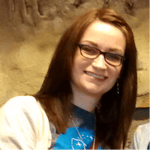 Melanie Fox is currently the founder and executive director of Central Indiana Science Outreach and a Postdoc at Indiana University School of Medicine. She is particularly interested in science communication and fundamental molecular biology.
Melanie Fox is currently the founder and executive director of Central Indiana Science Outreach and a Postdoc at Indiana University School of Medicine. She is particularly interested in science communication and fundamental molecular biology.
Additional Resources
I asked some colleagues to share valuable life lessons they have learned during their scientific training and wrote about them in a blog post on Born to Science:
More and more voices of encouragement emphasize the important roles of scientists outside of academia One recent example:
Resources on the Addgene Blog
- Read Joanne Kamen's Blog Series on Mentoring for Scientists
- Read Emma Markham's Post on Finding Your Perfect Job After University
- Browse All of Our Career Posts
Resources on the Addgene.org
- Find Plasmids for Your Research
- Learn About A Variety of Different Fields on Our Collections Pages
Topics: Science Careers, Professional Development, Early Career Researcher
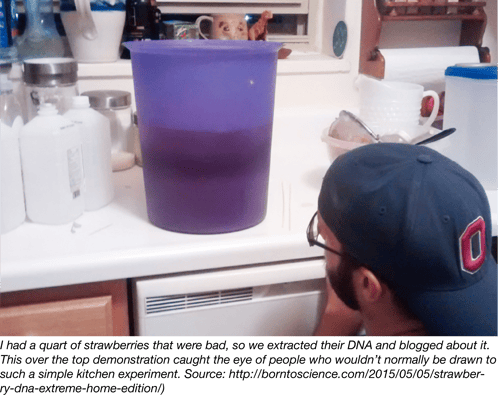






Leave a Comment